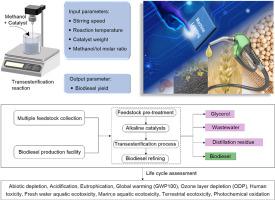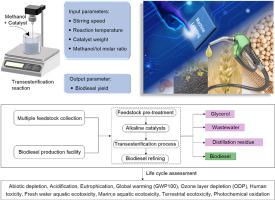Sustainable biodiesel synthesis from multi-feedstock systems: Integrating convolutional neural networks with life cycle assessment for energy-climate trade-off analysis
IF 10
1区 环境科学与生态学
Q1 ENGINEERING, ENVIRONMENTAL
引用次数: 0
Abstract
Biodiesel is widely regarded as a viable alternative to fossil fuels and a strategic approach to mitigating climate change. Its production, primarily through the transesterification of plant- or waste-based biomass, is influenced by a variety of experimental factors, including catalyst type, reaction temperature, and feedstock properties. However, conducting the optimization of experimental procedures and comprehensive environmental assessment remains challenging due to the diversity of feedstocks and the variability in reaction conditions, which introduce significant complexity and uncertainty in increasing the production of biodiesel while reducing its environmental impact. To address this challenge, in this work, the integration of machine learning (ML) and life cycle assessment (LCA) in biodiesel production offers a powerful approach to improving both environmental and economic performance. We compared the predictive accuracy of five ML models for biodiesel yield based on transesterification reaction. The results indicated that the Convolutional Neural Network could be a more suitable model for accurate biodiesel yield prediction because of its lowest validation RMSE (5.667) and highest correlation coefficient value (0.9165). In addition, we analyzed the environmental impact of different biomass conversion though LCA. The LCA showed methanol consumption contributed over 90 % of environmental impacts in virgin oils, while waste cooking oil's main burden came from regeneration, contributing 41.0–99.9 % depending on the impact category. This ML-LCA coupling not only improves the accuracy of process optimization but also provides a holistic view of environmental trade-offs across diverse feedstocks, paving the way for smarter and greener biodiesel production strategies.


从多原料系统合成可持续生物柴油:将卷积神经网络与能源-气候权衡分析的生命周期评估相结合
生物柴油被广泛认为是化石燃料的可行替代品,也是缓解气候变化的战略途径。其生产主要通过植物或废物基生物质的酯交换反应,受到多种实验因素的影响,包括催化剂类型、反应温度和原料性质。然而,由于原料的多样性和反应条件的可变性,进行实验程序的优化和综合环境评估仍然具有挑战性,这在增加生物柴油产量的同时减少其对环境的影响方面引入了显著的复杂性和不确定性。为了应对这一挑战,在这项工作中,将机器学习(ML)和生命周期评估(LCA)集成到生物柴油生产中,为改善环境和经济绩效提供了一种强有力的方法。我们比较了基于酯交换反应的五种ML模型对生物柴油产率的预测精度。结果表明,卷积神经网络具有最低的验证RMSE(5.667)和最高的相关系数值(0.9165),是一种更适合生物柴油产量准确预测的模型。此外,我们还通过LCA分析了不同生物量转化对环境的影响。LCA表明,甲醇消耗对初榨油的环境影响贡献超过90%,而废食用油的主要负担来自再生,根据影响类别的不同,贡献41.0 - 99.9%。这种ML-LCA耦合不仅提高了过程优化的准确性,而且提供了不同原料之间环境权衡的整体视图,为更智能和更环保的生物柴油生产策略铺平了道路。
本文章由计算机程序翻译,如有差异,请以英文原文为准。
求助全文
约1分钟内获得全文
求助全文
来源期刊

Journal of Cleaner Production
环境科学-工程:环境
CiteScore
20.40
自引率
9.00%
发文量
4720
审稿时长
111 days
期刊介绍:
The Journal of Cleaner Production is an international, transdisciplinary journal that addresses and discusses theoretical and practical Cleaner Production, Environmental, and Sustainability issues. It aims to help societies become more sustainable by focusing on the concept of 'Cleaner Production', which aims at preventing waste production and increasing efficiencies in energy, water, resources, and human capital use. The journal serves as a platform for corporations, governments, education institutions, regions, and societies to engage in discussions and research related to Cleaner Production, environmental, and sustainability practices.
 求助内容:
求助内容: 应助结果提醒方式:
应助结果提醒方式:


